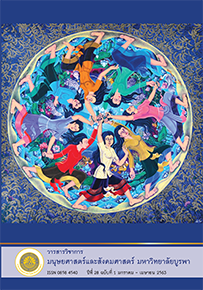การใช้บริการเว็บไซต์ตัวแทนการท่องเที่ยว: บุคลิกลักษณะ ทัศนคติ อิทธิพลทางสังคม ความเป็นประโยชน์ของข้อมูล และความตั้งใจเชิงพฤติกรรม
Main Article Content
บทคัดย่อ
การวิจัยนี้ศึกษาบนพื้นฐานของทฤษฎีการกระทำที่มีเหตุผล แบบจำลองการยอมรับข้อมูล และแนวคิดบุคลิกลักษณะ มีวัตถุประสงค์เพื่อศึกษาบุคลิกลักษณะ ทัศนคติในการใช้บริการ อิทธิพลทางสังคม คุณภาพของข้อมูล ความน่าเชื่อถือของแหล่งข้อมูล และความเป็นประโยชน์ของข้อมูลที่ส่งผลต่อความตั้งใจในการใช้บริการเว็บไซต์ตัวแทนการท่องเที่ยว ดำเนินการวิจัยเชิงปริมาณโดยใช้แบบสอบถามเป็นเครื่องมือในการเก็บรวบรวมข้อมูลด้วยตัวเองและทางออนไลน์ผ่านเฟซบุ๊กแฟนเพจด้านการท่องเที่ยวและห้องบลูแพลนเน็ตในเว็บไซต์พันทิปดอทคอม จากกลุ่มตัวอย่างที่เคยอ่านความคิดเห็นออนไลน์และไม่เคยใช้บริการจองโรงแรมที่พักบนเว็บไซต์ตัวแทนการท่องเที่ยว จำนวน 400 คน ผลการวิจัยพบว่า ตัวแปรทำนายทั้งหมดส่งผลต่อความตั้งใจในการใช้บริการเว็บไซต์ตัวแทนการท่องเที่ยว โดยอิทธิพลทางสังคม และทัศนคติในการใช้บริการส่งผลต่อความตั้งใจในการใช้บริการเว็บไซต์ตัวแทนการท่องเที่ยวอย่างมีนัยสำคัญในทิศทางบวกมาก ในขณะที่ความเป็นประโยชน์ของความคิดเห็นออนไลน์เป็นตัวทำนายสำคัญต่อความตั้งใจในการใช้บริการเว็บไซต์ตัวแทนการท่องเที่ยวอย่างมีนัยสำคัญในทิศทางบวกมากที่สุด ทั้งนี้ความคิดเห็นออนไลน์จะเป็นประโยชน์ต่อบุคคลได้นั้นขึ้นอยู่กับตัวแปรด้านคุณภาพของความคิดเห็นออนไลน์และความน่าเชื่อถือของแหล่งข้อมูลที่ส่งผลในทิศทางบวก
Downloads
Article Details
บทความทุกบทความเป็นลิขสิทธิ์ของวารสารวิชาการมนุษยศาสตร์และสังคมศาสตร์ มหาวิทยาลัยบูรพาเท่านั้น
เอกสารอ้างอิง
กรณษา แสนละเอียด, พีรภาว์ ทวีสุข, และศรีไพร ศักดิ์รุ่งพงศากุล. (2560). การยอมรับเทคโนโลยีที่มีอิทธิพลต่อแนวโน้มความตั้งใจในการใช้บริการซื้อสินค้าผ่านช่องทางออนไลน์ของกลุ่มเบบี้บูมเมอร์ในกรุงเทพมหานคร. วารสารปัญญาภิวัฒน์, 9(3), 3-15.
กรรณิกา ต่อเจริญ. (2555). ผลกระทบของข้อมูลสินค้าประเภทบริการและความคิดเห็นออนไลน์ที่มีต่อความเชื่อถือไว้วางใจผู้ขายสินค้าประเภทบริการและความตั้งใจซื้อสินค้าประเภทบริการบนอินเทอร์เน็ต. วิทยานิพนธ์วิทยาศาสตรมหาบัณฑิต, สาขาวิชาการพัฒนาซอฟต์แวร์ด้านธุรกิจ, คณะพาณิชยศาสตร์และการบัญชี, จุฬาลงกรณ์มหาวิทยาลัย.
กัญญารินทร์ วัฒนะเรืองนันท์. (2558). อิทธิพลของ Beauty Influencers ที่มีต่อพฤติกรรมการซื้อเครื่องสำอางของผู้บริโภคกลุ่มวัยทำงานตอนต้น ในเขตกรุงเทพมหานคร. วิทยานิพนธ์วารสารศาสตรมหาบัณฑิต, สาขาวิชาการจัดการการสื่อสารองค์กร, คณะวารสารศาสตร์และสื่อสารมวลชน, มหาวิทยาลัยธรรมศาสตร์.
ฉัตรนภา ติละกุล. (2555). การศึกษาบุคลิกภาพของพนักงานกลุ่มเจนเนอเรชั่นวายที่มีผลต่อความต้องการคุณลักษณะงาน: ศึกษาเฉพาะกรณีบริษัทเอกชนแห่งหนึ่ง. การค้นคว้าอิสระบริหารธุรกิจมหาบัณฑิต, สาขาวิชาการจัดการทรัพยากรมนุษย์, บัณฑิตวิทยาลัย, มหาวิทยาลัยหอการค้าไทย.
สาธิตา สุทธิไตรรงค์. (2556). ผลกระทบของการสื่อสารแบบปากต่อปากบนอินเทอร์เน็ต (Electronic word-of-mouth) ต่อกระบวนการตัดสินใจซื้อของผู้บริโภคในธุรกิจร้านอาหาร. การค้นคว้าอิสระวิทยาศาสตรมหาบัณฑิต, สาขาวิชาการบริหารการตลาด, คณะพาณิชยศาสตร์และการบัญชี, มหาวิทยาลัยธรรมศาสตร์.
สำนักงานพัฒนาธุรกรรมทางอิเล็กทรอนิกส์ (องค์การมหาชน). (2560). รายงานผลการสำรวจพฤติกรรมผู้ใช้อินเทอร์เน็ตในประเทศไทย ปี 2560. กรุงเทพฯ: กระทรวงดิจิทัลเพื่อเศรษฐกิจและสังคม.
สำนักงานพัฒนาธุรกรรมทางอิเล็กทรอนิกส์ [องค์การมหาชน]. (2562). รายงานผลการสำรวจพฤติกรรมผู้ใช้อินเทอร์เน็ตในประเทศไทย ปี 2561. กรุงเทพฯ: กระทรวงดิจิทัลเพื่อเศรษฐกิจและสังคม.
สำนักงานเศรษฐกิจอุตสาหกรรม. (2560). 10 อุตสาหกรรมเป้าหมาย กลไกขับเคลื่อนเศรษฐกิจเพื่ออนาคต. เข้าถึงได้จาก http://www.oie.go.th/sites/default/files/attachments/publications/newengineofgrowth.pdf
อลิสา พรหมโชติชัย. (2553). ความสัมพันธ์ระหว่างลักษณะบุคลิกภาพเชิงรุก รูปแบบความคิดสร้างสรรค์ และความพึงพอใจต่อลักษณะงาน กรณีศึกษาบริษัทธุรกิจโฆษณาแห่งหนึ่ง. การค้นคว้าอิสระศิลปศาสตรมหาบัณฑิต, สาขาวิชาจิตวิทยาอุตสาหกรรมและองค์การ, คณะศิลปศาสตร์, มหาวิทยาลัยธรรมศาสตร์.
อิทธิภูมิ พรหมมา, และธีรารัตน์ วรพิเชฐ. (2558). การใช้ความคิดเห็นของลูกค้าในสื่อสังคมออนไลน์ที่มีผลต่อการใช้บริการของธุรกิจโรงแรมไทย. วารสารวิทยาการจัดการสมัยใหม่, 8(2), 129-141.
Booking.com. (2562). รีวิวจากผู้เข้าพักคืออะไรและใครบ้างที่เขียนรีวิวได้?. เข้าถึงได้จาก https://partner.booking.com/th/ความช่วยเหลือ/รีวิวจากผู้เข้าพักคืออะไรและใครบ้างที่เขียนรีวิวได้
Alvarez, M., & Asugman, G. (2006). Explorers versus planners: A study of Turkish tourists. Annals of Tourism Research, 33(2), 319-338.
Burgess, S., Sellitto, C., Cox, C., & Buultjens, J. (2011). Trust perceptions of online travel information by different content creators: Some social and legal implications. Information Systems Frontiers, 13(2), 221-235.
Blackwell, D., Leaman, C., Tramposch, R., Osborne, C., & Liss, M. (2017). Extraversion, neuroticism, attachment style and fear of missing out as predictors of social media use and addiction. Personality and Individual Differences, 116, 69-72.
Cheung, C. M. K., Lee, M. K. O., & Rabjohn, N. (2008). The impact of electronic word-of-mouth: The adoption of online opinions in online customer communities. Internet Research, 18(3), 229-247.
Cochran, W. G. (1977). Sampling techniques (3rd ed.). New York: John Wiley & Sons.
Erkan, I. (2016). The influence of electronic word of mouth in social media on consumers’ purchase intentions. A Doctoral of Philosophy Thesis, Brunel Business School, Brunel University.
Fishbein, M., & Ajzen, I. (1975). Belief, attitude, intention, and behavior: An introduction to theory and research. Reading, MA: Addison-Wesley.
Freitag, M., & Bauer, P. C. (2016). Personality traits and the propensity to trust friends and strangers. The Social Science Journal, 53(4), 467-476.
Gangai, K. N., & Agrawal, R. (2016). The influence of personality traits on consumer impulsive buying behavior. International Journal of Marketing and Business Communication, 15(1), 35-42.
Goldberg, L. R. (1993). The structure of phenotypic personality traits. American Psychologist, 48(1), 26-34.
Heinström, J. (2003). Five personality dimensions and their influence on information behavior. Information Research, 9(1), 165-188.
Internet World Stats. (2017). Internet users in the world by regions. Retrieved from https://www.internetworldstats.com/stats.htm
Jalilvand, M. R., & Samiei, N. (2012). The effect of word of mouth on inbound tourists’ decision for travelling to Islamic destinations (The case of Isfahan as a tourist destination in Iran). Journal of Islamic Marketing, 3(1), 12-21.
Kim, H. J. (2016). Intention to continue using a social network site: Effects of personality traits and site quality. Social Behavior and Personality, 44(9), 1419-1428.
Lee, H. Y., Qu, H., & Kim, Y. S. (2007). A study of the impact of personal innovativeness on online travel shopping behavior–A case study of Korean travelers. Tourism Management, 28(3), 886-897.
Murphy, L., Mascardo, G., & Benckendorff, P. (2007). Exploring word-of-mouth influences on travel decisions: Friends and relatives vs. other travelers. International Journal of Consumer Studies, 31(5), 517-527.
Özgüven, N., & Mucan, B. (2013). The relationship between personality traits and social media use. Social Behavior and Personality, 41(3), 517-528.
Peng, L., Liao, Q., & Wang, X. (2016). Factors affecting female user information adoption: An empirical investigation on fashion shopping guide websites. Electronic Commerce Research, 16(2), 145-169.
Pornsakulvanich, V. (2017). Personality, attitudes, social influences, and social networking site usage predicting online social support. Computers in Human Behavior, 76, 255-262.
Pornsakulvanich, V. (2018). Excessive use of Facebook: The influence of self-monitoring and Facebook usage on social support. Kasetsart Journal of Social Sciences, 39(1), 116-121.
Qasem, Z. A. (2014). The role of website experience in building attitude and intention towards online shopping. A Doctoral of Philosophy Thesis, Leeds University Business School, The University of Leeds.
Quambusch, N. (2015). Online customer reviews and their perceived trustworthiness by consumers in relation to various influencing factors. In 6th IBA Bachelor Thesis Conference, Enschede, Netherlands. Netherlands: University of Twente.
Shu, M. L., & Scott, N. (2014). Influence of social media on Chinese students’ choice of an overseas study destination: An information adoption model perspective. Journal of Travel & Tourism Marketing, 31(2), 288-302.
Sparks, B. A., & Browning, V. (2011). The impact of online reviews on hotel booking intentions and perception of trust. Tourism Management, 32(6), 1310-1323.
Statista. (2018). Do you trust online customer reviews as much as personal recommendations?. Retrieved from https://www.statista.com/statistics/315755/online-customer-review-trust/
Suh, B., & Han, I. (2003). The impact of customer trust and perception of security control on the acceptance of electronic commerce. International Journal of Electronic Commerce, 7(3), 135-161.
Sussman, S. W., & Siegal, W. S. (2003). Informational influence in organizations: An integrated approach to knowledge adoption. Information Systems Research, 14(1), 1-43.
Tang, C. M. F., & Lam, D. (2017). The role of extraversion and agreeableness traits on Gen Y’s attitudes and willingness to pay for green hotels. International Journal of Contemporary Hospitality Management, 29(1), 607-623.
Verma, V. K., Kumar, S., & Chandra, B. (2017). Big Five personality traits and tourist’s intention to visit green hotels. Indian Journal of Scientific Research, 15(2), 79-87.
Vladimirov, Z. (2012). Customer satisfaction with the Bulgarian tour operators and tour agencies’ websites. Tourism Management Perspectives, 4(3), 176-184.
Waheed, A., Yang, J., & Webber, J. (2017). The effect of personality traits on sales performance: An empirical investigation to test the five-factor model (FFM) in Pakistan. Interdisciplinary Journal of Information, Knowledge, and Management, 12(12), 139-157.
Zhu, D. H., Chang, Y. P., & Luo, J. J. (2016). Understanding the influence of C2C communication on purchase decision in online communities from a perspective of information adoption model. Telematics and Informatics, 33(1), 8-16.


